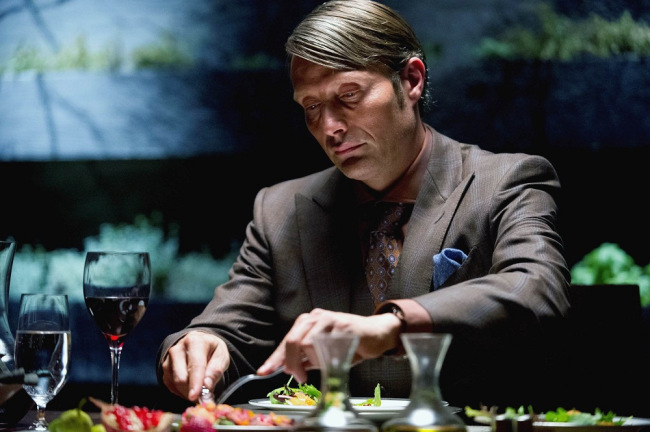
By all accounts, NBC's Hannibal should not be a show I'm even watching, let alone breathlessly anticipating every week. For starters, it's a prequel, that laziest form of storytelling that offers much in the way of fan service but little in the way of drama or surprise, as the audience always knows exactly where the tale is going. On top of that, it's a revival of a franchise that novelist Thomas Harris and film producer Dino De Laurentiis had run deep into the ground via a string of shitty post-Silence of the Lambs Hannibal Lecter novels and even shittier movies based on those novels.
But I gave the show a chance for one reason: It was spearheaded by noted TV scribe and producer Bryan Fuller, the brains behind Wonderfalls and Pushing Daisies, the man who was largely responsible for making the first season of Heroes appointment television. (It was no coincidence that show collapsed once he left the writers' room.) A successful revival of the Lecter franchise seemed like a long shot no matter who was at the helm, but putting Fuller in charge at least offered a glimmer of hope that the series could prove worthwhile.
Seven episodes in, and it's no longer a matter of hoping the show will be any good. Now it's about finding a way to keep this damn thing on the air. Whatever I had in my head as the best-case scenario for Hannibal, Fuller has surpassed it. He's taken a franchise that has offered nothing but diminishing returns for more than a decade and nearly returned it to the heights it reached in Harris's first two Lecter books and the first films made from them (Michael Mann's Manhunter and Jonathan Demme's The Silence of the Lambs). Hannibal is atmospheric and chilling and enthralling and morbidly funny and everything you'd want from a Lecter TV show.
Ironically, part of the reason it's so successful is because it repositions Lecter back to his original role — as a side player to the primary protagonist, in this case a new interpretation of FBI criminal profiler Will Graham, played here by Hugh Dancy. Graham is the lead in the Harris novel Red Dragon, where he consults an imprisoned Hannibal Lecter, with whom he shares a short but violent history with, on a troubling murder case. Fuller's smart move was to wildly expand the history the two shared in their pre-Red Dragon days.
Rather than having the pair meet just a short time before Will realizes Lecter is a psychopath, Hannibal posits that the two shared a lengthy and oftentimes rewarding professional relationship before Will finally uncovered Hannibal's dark secret (a moment that's not even expected to occur this season). Will helps the FBI track down a series of bizarre serial killers by opening his mind to its darkest corners, and Lecter is there to counsel Will and help him find his way back into the light. Part of the fun of that setup is that the audience knows Hannibal Lecter is a psychopathic murderer (and cannibal to boot). To its credit, the show has never tried to play coy with this fact or hide it from a young audience who wasn't born yet when The Silence of the Lambs was sweeping the Oscars. The show makes it clear that he's evil, and we know the Lecter/Graham relationship can only end in pain and chaos. But, for the moment, the two appear to be perfect companions.
Another smart move was in the casting of Lecter. The two actors who had played him previously — Brian Cox and, more notably, Anthony Hopkins — were older, Anglo and brought the gravity of a commanding stage presence with them. Mads Mikkelsen, by comparison, is low-key, dark and foreign, with a tough-to-place accent that adds an eerie quality to his performance. He's also handsome and accessible, which makes his murderous transgressions all the more unnerving. Mikkelsen's Hannibal is nothing like the one that made Hopkins famous the world over, and the show is a more interesting take on the Lecter mythos for it.
Together, Dancy, Mikkelsen and Laurence Fishburne (who plays Jack Crawford, head of the FBI's Behavioral Science Unit) form a triple-pronged anchor that helps stabilize the show, lest it spin away in a tornado of unrelenting doom, gloom and gore. (And, wow, is this show gory. The Walking Dead has clearly forced other networks — even basic cable ones — to raise their game when it comes to on-screen violence.) Even some of the show's smaller pieces, like Jack's band of CBS-procedural wannabes, are used to good effect. In their case, they provide little bits of levity when the should could use some.
The end result is the best hour-long NBC has had in an eternity and the only network drama worth being excited about right now. So, of course, the ratings are low. So low that NBC has yet to commit to a second season despite the fact that they announced their entire fall schedule at their upfront presentation this past weekend. Hannibal is their only series that remains in limbo, though a decision on whether to keep or kill it is expected to come over the next few weeks.
There is precedent for keeping it. A number of low-rated but critically-lauded shows, including Chuck, Community and Parks and Recreation, had or are having nice lifespans on the network. Despite being in the TV business, NBC is terrible at making good television, so they often choose to let shows with small but passionate fan bases remain on the schedule. Hannibal deserves the same fate, not only because it's a great show now, but also because I want to see what Fuller has up his sleeve once the series finally runs into the books. At that point, what was a prequel transforms into a full-on reboot, which I'd be encouraged to see this cast tackle, despite the fact that Red Dragon has already been filmed twice. At the moment, NBC doesn't hold the rights to The Silence of the Lambs, so if Hannibal would stick around for a while, it's doubtful we'd ever see Clarice Starling show up. But that's not a big deal, as this is the Will and Hannibal show, and Will plays no part in the Lambs story.
So come on, NBC. Give this dark and quirky show more time to find an audience. There's a lot of blood and guts on television these days, but not often is it used in the service of telling a really good story. With Hannibal, Fuller is backing up the shocking visuals with thoughtful takes on characters we only thought we were tired of. Don't send Lecter away now that he's finally interesting once again.











